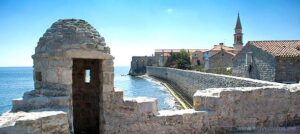Budva, an ancient town, right next to the coast, hides a rich past. Flipping through the shining pages of its history, we dive into an unusual time machine through which the stormy centuries in which the people of Budva continuously fought for existence and duration in this area, often stumbling and falling under the powerful ones, but always emerging victorious, with the glory of the fight for freedom.
If we go back to the distant past, we reach the 5th century BC, in which we come across numerous legends that hide the secret of Budva’s origin. According to one legend, the city of Budva was founded by Cadmus, the ruler of Boeotia and later the king of Illyria. At that time, the first inhabitants living in Budva were the Illyrians.
The period in which the powerful Roman Empire began its conquest and expansion into the surrounding areas begins in the 3rd century BC. Already in the 2nd century BC, Budva falls under Roman rule. At that time, trade was developed in the area of Budva, and the population from the surrounding areas engaged in the cultivation of vines and olives.
In a series of centuries it was conquered by the Greeks, Romans, Byzantines, Venetians, Turks, French and Austrians. Many conquerors and emperors changed, they destroyed and devastated this region, but Budva always emerged victoriously from the ashes, it was born of itself, defying countless forces that did not destroy it because it refused to be destroyed. Surrounded by ancient walls, it preserves numerous monuments of timeless value that bear witness to the stormy times of this region. Cultural and historical treasures worth admiring remain.

The people of this region fought not only with weapons against various invaders, but also with the indestructible power of their spirit. Even in the worst times, they built, created and wrote. Only in that way did the people survive and persevere, relying on the central pillars of their being: faith, origin, tradition, culture, which were always guiding ideas, even in times when it seemed that there was only a dead end.
Budva is undoubtedly one of the oldest cities in the Adriatic basin. As a Greek emporium, it was a place where the influences of the East and the West, the continent and the Mediterranean, Hellenic and Roman cultures intersected. The rich market attracted buyers and merchants, adventurers, travelers, adventurers, sailors and shipwrecked people.